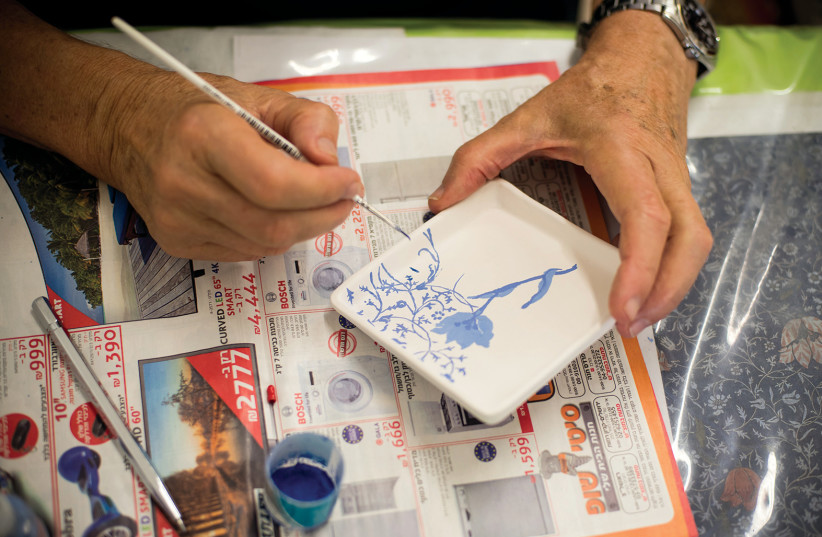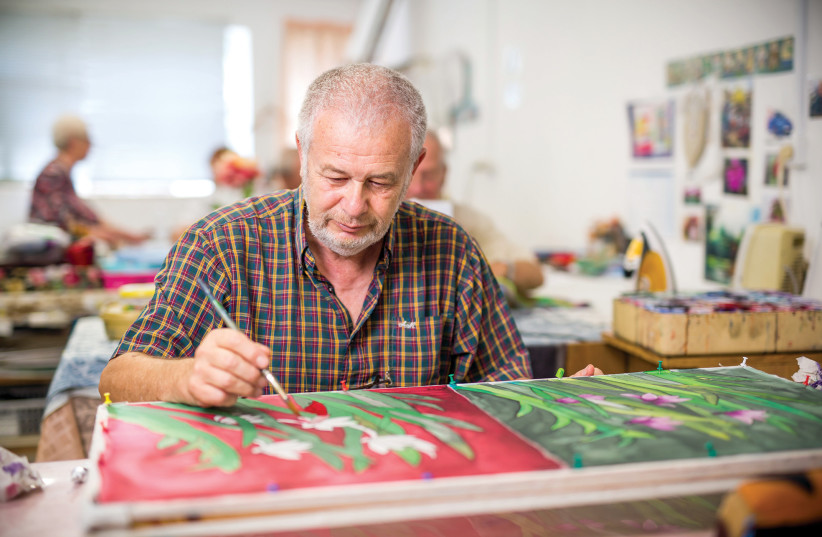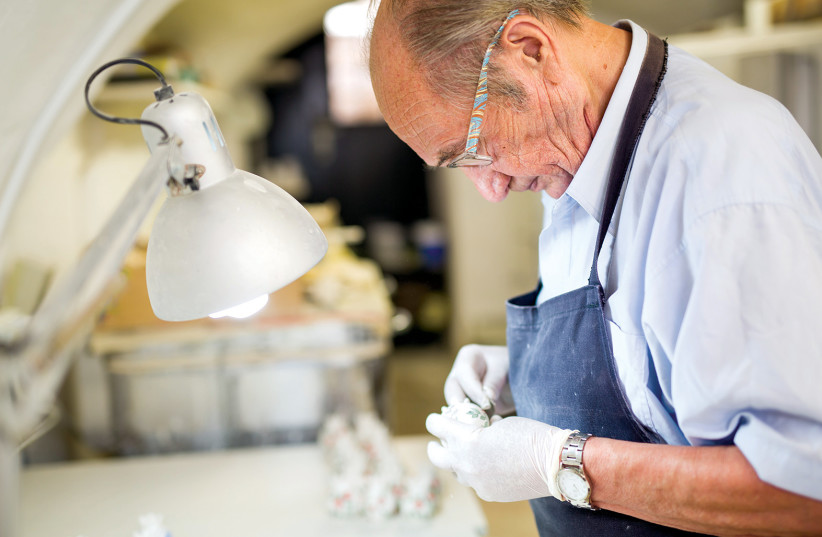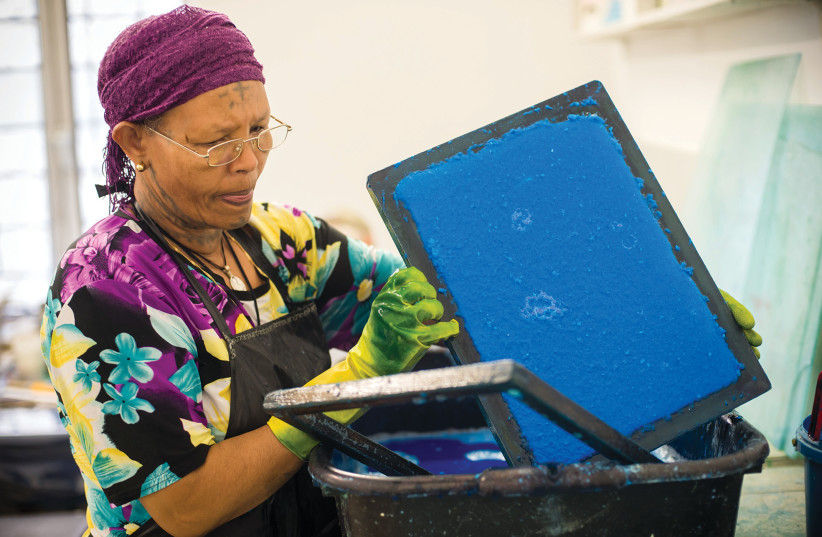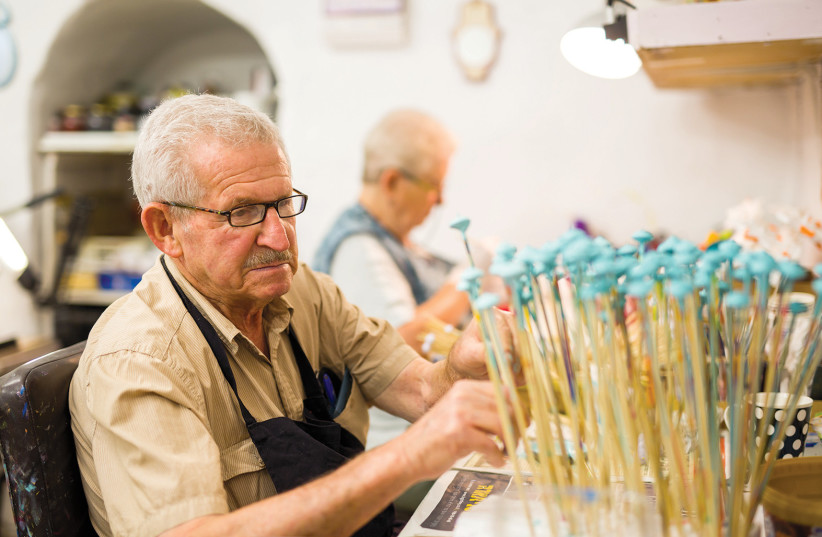Jerusalem’s olim senior citizens get new lease on life at Yad Lakashish

The people who come here range from recent retirees to the oldest one who comes here – five days a week – who is 96. Around 65% are Holocaust survivors. All are olim.
As we all patently and painfully know today, the lockdowns hit the elderly the hardest. We all had a rough ride as the powers that be decided the best way to combat the spread of the coronavirus was to confine us to our own four walls and very immediate environs. The wisdom and efficacy of that seems to be increasingly up for grabs.
But one thing is for certain, depriving our seniors of their freedom of movement and ability to engage in some kind of social interaction – not to mention meet up with their loved ones – did nothing for their emotional wellbeing.
The latter is the primary concern of Yad Lakashish. The title translates literally as “Help for the Aged,” but the front wall of the organization’s premises on Shivtei Yisrael Street proffers the more factually accurate Lifeline for the Old as an English equivalent.
Yad Lakashish began life 60 years ago, thanks to the perception, generosity and kindness of the late Miriam Mendilow. She was a Jerusalemite English schoolteacher who, from time to time, took her classes out for walks around town. On occasion, she’d notice some of the youngsters looking disapprovingly at elderly people who were clearly down-at-the-heels. “She saw how the children treated them with disdain,” explains Yad Lakashish director Ariela Schwartz-Zur. “She wondered why that was and she realized it was because the people on the street looked worthless; they were not doing anything with their life.”
It was a challenging time for many in the then young state. “Don’t forget, at that point, Israel had only been around for 14 years. There were lots of olim, some had no family and nowhere to go,” she adds.
Mendilow nipped smartly into the breach. “She told the elderly people she could give them money and work,” Schwartz-Zur says. She opened a small bookbinding workshop where eight local elderly men were trained in the craft. Local schools brought tattered books from their libraries to the workshop and for a small fee, the elderly rebound the books. The school children started to bond with the elderly, and soon the group of beggars rediscovered that even in their old age, they had something to contribute to society.
FOR THE PAST six decades many of Jerusalem’s less affluent senior residents have somewhere to go. And not just any old place. Yad Lakashish is not a shelter, or somewhere the elderly go to sit around and wait for the next meal. They go there to work and produce items that go on sale at the center’s physical store as well as on their website.
“The people who come here range from recent retirees to the oldest one who comes here – five days a week – who is 96. Around 65% are Holocaust survivors. All are olim (new immigrants). You hardly hear any Hebrew here,” Schwartz-Zur laughs.
The diverse source spread is taken into account. “When we opened in the 1960s, most of the people who came here were from eastern countries – Yemen, Morocco, Iraq. Then, in the 1990s, there was the mass aliyah from the former Soviet Union and we increasingly also get people from Ethiopia.” That, she says, is a natural development.
“It is not by chance that we are talking about olim because, everywhere, immigrants always comprise the most challenged group in terms of absorption into society. They don’t know the local language or culture. The circles of family and friends are usually limited.” Add to that, generally, olim from non-Western countries don’t come here with too much in the way of creature comfort fittings and fixtures.
The organization is keenly aware of the needs of senior citizen olim. “If you don’t know Hebrew you can’t use the skills you bring with you here, like engineering. At best, you might be able to find work as a cleaner or guard. That severely limits your chances of integrating in Israeli society. And the state doesn’t give them much as a pension, which they are supposed to live off. They often have to choose between buying medication or food.”
That, is where Yad Lakashish steps in, and does its best to fill the gaping hole left by the state support and welfare bodies.
According to Schwartz-Zur, a measly 3% of the organization’s costs are covered by the state welfare services. The rest largely comes from donations. The director says the organization addresses the needs of socioeconomically-challenged senior citizens with a range of much-needed services and facilities on all sorts of levels.
“For starters we give them a reason to get out of bed every morning. Right now we are giving everyone a gift for Passover, of NIS 1,000, so they can buy themselves food and clothing.” And, maybe, get a little something for the grandkids? “Yes, it is important for them to feel they can give to others, their families.”
Yad Lakashish is not about charity handouts. The pensioners that staff the workshops put in their daily shift and earn the benefits they get by right. In addition to the meaningful work opportunities, each of the artisans receives a comprehensive package of financial benefits which vastly improves their standard of living. That includes monthly stipends, an unlimited monthly travel pass, a daily hot nutritional meal, access to a dental care subsidy, holiday bonuses, and biannual group excursions.
“Improved financial security allows these elderly to meet their basic needs such as housing, food and medicine,” the organization’s website notes. “While the financial support is significant, they greatly benefit from the resulting independence, renewed self-worth and dignity.”
Schwartz-Zur tells me she received proof of that motivational mix on the day of my visit. “Svetlana, who works in the textile workshop, just told me she is happy about the money, but even happier with the attention. It is so important for them to know there is somewhere where there are people who are waiting for them to arrive.”
Every morning at 8 o’clock, more than 230 seniors from in and around Jerusalem duly make their way over to the center of town. They spend the next four hours putting their Yad Lakashish training to good effect in their various chosen lines of craft, including bookbinding, ceramics, knitting, papier-mâché and producing all kinds of decorative metal items.
Over the years I have been accustomed to getting the lowdown about this or that enterprise, by honchos with seemingly inexhaustible reserves of superlatives. While one can understand why they do their best to paint as glowing a picture as possible, the street level reality does not always match up to the promo marketing. In Schwartz-Zur’s case, undisguised enthusiasm notwithstanding, what I experienced as I made my way through the nine workshops was far and away more impressive and heartwarming than anything the director had told me.
Schwartz-Zur says it is a win-win situation for all concerned. The seniors are given the opportunity to acquire new skill sets, as experts in the various fields – including graduates and staff members from Bezalel Academy of Arts and Design – train them in one of the many areas of artistry and artisanship that feature in the Yad Lakashish employment purview. That, in itself, helps boost the trainee’s self-image, confidence and sense of worth.
THEN THERE is the social side. Even without the aforementioned pandemic-induced restrictions on movement, psychologists and social workers will tell you that one of the main factors that contribute to deterioration in emotional and physical health among our older members of society is a pernicious feeling of loneliness. The Yad Lakashish setup heads that off at the pass. “You have work and work colleagues,” Schwartz-Zur notes. “You have friends, and your day takes on meaningful content.”
That was endearingly palpable as I did the rounds of the workshop dotted around the 19th-century complex. I have visited my fair share of sheltered housing and other senior citizen facilities but even the best of that lot wasn’t a patch on the wholesome, spiritually – and financially – gainful ambiance I encountered at Yad Lakashish. The people I saw there were focused, vivacious and undeniably animated. Before we went into the bookbinding area I met a religious Ethiopian-born artisan outside in the yard and we engaged in sunny chit-chat. The gent was clearly in good spirits and made me feel welcome.
The feel-good vibe was evident indoors too as I caught the bindery folk doing their thing. Some were processing papier-mâché into slats, to be used for new book covers. I was shown an incipient binding which already looked like the real deal. I began considering bringing some of my own timeworn tomes in for repair.
Others use the mushy raw material to create all kinds of shapes and artifacts, from pencil thin rolls to envelopes, notebooks and greetings cards, and an amazing array of decorative items and toys. “That has a plastic bottle inside,” says my smiley pal from the yard, pointing at the fuselage of a white paper mash-coated miniature airplane. “You would never have guessed would you?” he adds with a chuckle. Not a chance. It was also good to know a fundamentally polluting receptacle had been upcycled.
We moved onto the exclusively male metalworking area where brass sheeting was being carefully sculpted into latticework flora creations. It is a delicate pursuit requiring a good eye and steady hand. The venerable craftsmen were clearly blessed with both those valuable attributes.
That was evident from the spread of Judaica and various other examples of the workers’ aesthetically pleasing output on display on shelving at one end of the workshop. Daniel, who hails from Kharkiv in Ukraine near the Russian border – the scene of fierce battles with the Russian army over the past two months – proudly showed me some of the enticing end products, interspersing his Russian with the odd key word in Hebrew.
“This is work of the highest quality,” he told me by way of a Russian-speaking Yad Lakashish employee. “And look it this,” he added, drawing my attention to a decorative metal design on a chain, hanging from a bottle.
The shelves also sported some delightful hanukkiot, with a seminally Holy Land-oriented cutout complement and a pretty hefty-looking yet delicately crafted dreidels. Jewelry also comes into the metal workshop ambit.
The level of expertise the workers displayed is mightily impressive. The ceramics department, for example, puts out pottery artifacts with deftly hand-painted decorations, glazed vases and plates, and the embroidery and silk crafts artisans do an equally good job.
MAYA, A zesty Russian-born Hebrew-speaking octogenarian from the embroidery team smilingly spells out the Yad Lakashish deal. “This is occupational therapy for us,” she smiles. “This is a great [financial] help for us, and the food here is very tasty.”
Maya would like to spread the message. “I have a friend who goes to a community center in Shoham, and she asks why there isn’t something like this there, too. It’s a shame this is only in Jerusalem.”
Perhaps the word will get out and senior citizens elsewhere around the country will get the opportunity for a physically and emotionally healthier and more rewarding lifestyle.
Meanwhile, Jerusalemites and visitors to the city looking to get their hands on some quality craftwork and merchandise would do well to get on over to Shivtei Yisrael Street, or drop by the online store, and help some of our old folks into the bargain. ❖
For more information: www.lifeline.org.il
Jerusalem Post Store
`; document.getElementById("linkPremium").innerHTML = cont; var divWithLink = document.getElementById("premium-link"); if (divWithLink !== null && divWithLink !== 'undefined') { divWithLink.style.border = "solid 1px #cb0f3e"; divWithLink.style.textAlign = "center"; divWithLink.style.marginBottom = "15px"; divWithLink.style.marginTop = "15px"; divWithLink.style.width = "100%"; divWithLink.style.backgroundColor = "#122952"; divWithLink.style.color = "#ffffff"; divWithLink.style.lineHeight = "1.5"; } } (function (v, i) { });

